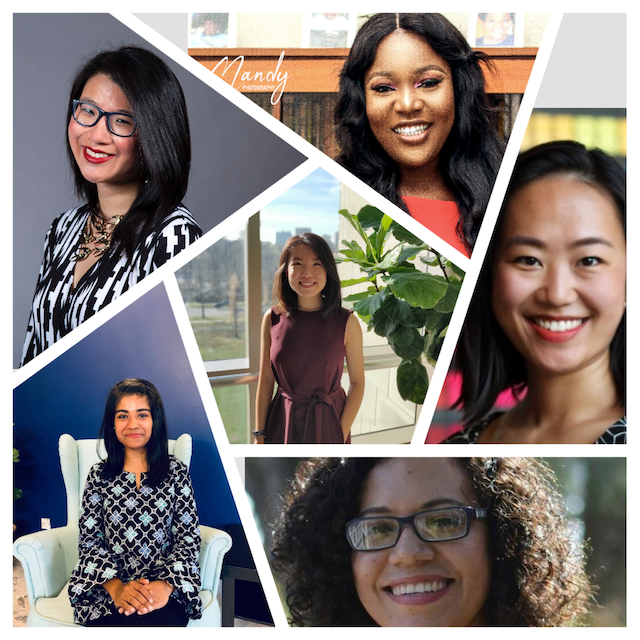【IWD Webinar Series】Women at Work: Perspectives on Gender and Workplaces Around the World

| Date(s) | Monday, 8 March 2021, 9:00-10:00 am |
|---|---|
| Venue |
Zoom Webinar (Register here) |
| Registration | Pre-registration required |
| Language | English Only |
| Abstract |
What is it like to be a woman at work today? What concerns do women have in different countries? How might we better support women at work? Join us as we chat with professionals and researchers from the US, Mexico, Nigeria, and Malaysia, through the lens of social science research. |
| Speaker Profile |
Ho Kwan Cheung, Ph.D. (Assistant Professor of Psychology at the University at Albany, SUNY) (she/her/hers) Dr. Ho Kwan Cheung is an assistant professor of Psychology, with a research program focusing on understanding experiences of working women and barriers to work-life balance. Her work has yielded more than 10 peer-reviewed publications in outlets such as Journal of Applied Psychology, Psychological Science, etc. She also works as an expert witness for employment discrimination lawsuits. Emellia Shariff (Managing Partner of Speak Up Malaysia) (she/her/hers) Emellia was admitted as an advocate & solicitor of the High Court of Malaya in 2015 and then worked as a compliance executive for a multinational GLC in Malaysia. Emellia is known for her work as a gender rights advocate on sexual harassment where she combined her legal, compliance and corporate governance training into helping organisations create a safe and productive environment. Her expertise includes developing anti-sexual harassment policies and code of conduct, establishing grievance and whistleblowing mechanisms, engaging with stakeholders to re-establish trust and working relationships, as well as handling complaints while overseeing investigations. Sane Gaytán, Ph.D. ( Assistant Professor at Universidad de Colima ) (she/her/hers) Laura Sanely Gaytán-Lugo is an Assistant Professor at Universidad de Colima in Mexico. She focuses on human-computer interaction (HCI). Her research interests include serious games and educational technology. She holds a Ph.D. in IT from the Universidad de Guadalajara and is part of Mexico’s National System of Researchers. She is a member of the Executive Committee of ACM-W North America and chair of the ACM SIGCHI Latin American HCI Community. Melissa Zhang (Stanford MBA and MS Energy & Resources joint degree candidate) (she/her/hers) Melissa Zhang is a Stanford MBA and MS Energy & Resources joint degree candidate and Venture Investor for the Stanford Graduate School of Business (GSB) Impact Fund. Melissa’s current research interests center on carbon removal and climate risk disclosure. Prior to Stanford, Melissa spent 5 years as a Portfolio Manager at BlackRock, Environmental, Social and Governance (ESG) Consultant for venture-backed data startup MioTech, and Policy Researcher for the 2020 Clean Energy for Biden campaign. Elaine Nkwocha (PhD Student and Teaching Assistant at Louisiana State University) (she/her/hers) Elaine Nkwocha is a PhD Student and Teaching Assistant in the Department of Biological Sciences, Louisiana State University. Elaine taught as an Assistant Lecturer in the Department of Biology/Microbiology/Biotechnology Alex Ekwueme Federal University Ndufu Alike Ikwo, Ebonyi State, Mathematics/Basic Science and Biology Teacher at different colleges/secondary schools and as a volunteer in her community in Nigeria. She is passionate about helping young people tap into their own passions and potential through mentorship, coaching and teaching. Moderator: Eureka Foong, Ph.D. (Tokyo College Postdoctoral Fellow) Eureka Foong is a Postdoctoral Fellow at Tokyo College, the University of Tokyo. Her research seeks to understand the design of social technologies that promote equity in emerging non-standard forms of work, such as remote work and online freelancing. In addition to academic research, Eureka has experience managing software design and research projects at Facebook and Adobe in the US and Piktochart in Malaysia. |
| Organized by | Tokyo College, The University of Tokyo |
| Contact | tokyo.college.event@tc.u-tokyo.ac.jp |
















